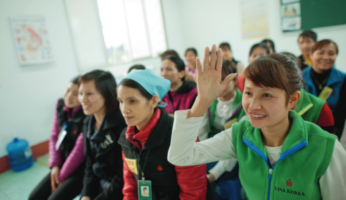
“We believe in women as catalysts for change,” Art Peck, CEO of Gap Inc., addressed to the crowd of global leaders, activists, and business people before him at the Clinton Global Initiative’s Annual Meeting. Since 2007, Gap Inc. has been transforming the lives of the women who make their clothes through an education program offered at their factories. The program is called P.A.C.E., which stands for Personal Achievement and Career Enhancement, and it has already impacted the lives of 30,000 women in 10 countries. What Mr. Peck said next showed that they’re only just getting started. From the same big stage came Gap Inc.’s most ambitious commitment to date: to bring education to one million women worldwide by 2020.
Globally the garment industry is one of the largest employers of low-skilled female workers and 80 percent of garment workers are women. Recognizing the opportunity for some serious impact, Gap Inc. leveraged their resources and relationships to launch the first P.A.C.E. program in India in 2007. Swasti Health Resource Center stepped in to help create the curriculum and implementation design and the International Center for Research on Women (ICRW) developed a framework for monitoring and assessing the program as it grew to new sites, while CARE continues to work with Gap, Inc.’s vendors and factory owners to implement the program and take ownership.
By 2010, P.A.C.E. programs were active in 10 countries across Asia and the positive impact was becoming increasingly apparent through ICRW reports. Where women once felt inadequate and incapable of advancing their lives, ICRW was finding women who felt empowered and confident, invigorated with a new sense of possibility for their futures, many in new leadership positions at the factories. The lessons they’d learn in the P.A.C.E. classroom often made their way into the local communities as women shared their new skills and knowledge with their families. The factories benefited as well, seeing better efficiency, productivity, and performance as well as rising retention rates and a workforce more highly skilled.
The program is entirely voluntary. Women choose to opt in after learning about P.A.C.E. through a factory-wide orientation. Usually taking about 8-10 months to complete, the program covers everything from financial literacy and stress management to general and reproductive health and hygiene. Safety and security as well as gender are pervasive themes across all subjects. Once the participants complete the life skills component, they move onto technical skills training, where they learn the skills critical to advancing their careers. The courses are taught by trained vendor staff and the graduates themselves.
What’s probably most remarkable about P.A.C.E. and the impact it’s had already is its ability to raise women to the status of role model and inspiration for their peers. The same women who 10 months before felt inadequate and powerless are now the leaders and the vision of what’s truly possible. Meet Sujatha, one such woman who has become a walking example of the power of the P.A.C.E. program.
After nearly a decade of life changing impact and 30,000 stories from women whose lives have been positively influenced by the P.A.C.E. program, Gap Inc. is confident and committed to reach even more women. One million women to be exact. Learn more about the P.A.C.E. program and their latest #1MWomen pledge at bewhatspossible.com/pace.
